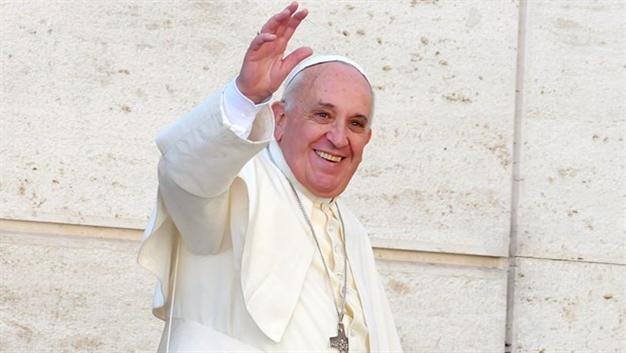Pope to be first foreign guest at Turkey's new presidential palace
ANKARA - ISTANBUL
 Pope Francis is set to be the first house guest at Turkey's new presidential palace during a visit to Turkey at the end of the month.
Pope Francis is set to be the first house guest at Turkey's new presidential palace during a visit to Turkey at the end of the month.During his three-day visit, the spiritual leader of the world's one billion Catholics will meet President Recep Tayyip Erdoğan and Turkey's top Muslim cleric, Mehmet Görmez. Erdoğan is scheduled to welcome Pope Francis as Vatican's Head of State with an "A-class" ceremony that will be organized at the gargantuan presidential palace in Ankara, which recently sparked a public debate due to its cost.
Known officially as the Presidential Palace but dubbed universally as the Ak Saray (White Palace), the complex takes up an area of 200,000 square metres (2.1 million square feet), has 1,000 rooms and draws its architectural inspiration from Turkey’s Ottoman and Seljuk heritage.
Controversy over the palace soared when Finance Minister Mehmet Şimşek told a parliamentary budget committee last week that the total cost so far was 1.37 billion Turkish lira ($615 million), around double the original price tag.
Pope Francis is scheduled to visit Mustafa Kemal's Atatürk's mausoleum in Ankara, before going to Istanbul on the second day of his program in Turkey. In Istanbul, visits to Hagia Sophia, which was the largest Orthodox cathedral once, as well as to the Blue Mosque, Saint Esprit Catholic Church and the Patriarchate are in the schedule.
'Overcoming the obstacles'
The visit is also seen as an opportunity to improve relations between the Eastern and the Western churches. The 76-year-old Argentinian pontiff delivered a speech to the Orientale Lumen Foundation last month where he said he wished to "overcome the obstacles that still divide us."
According to the Vatican, the pontiff also said he hoped to build stronger ties between the two churches.
Father Remzi Diril, a newly-ordained priest of the Chaldean Catholic Church in Istanbul's Beyoğlu neighborhood, describes the visit as important for Christian unity.
"We believe it will strengthen relations between the Eastern and the Western churches. We don't have any doubt about that," he said during an interview with Anadolu Agency.
It is commonly believed that the division between the Catholic and the Orthodox churches -- often referred to as the 'Great Schism' -- dates back to 1054.
The conflicts between the Eastern and Western churches developed gradually as the Roman Empire fragmented. Although they shared the same faith, the two traditions have remained divided.
'Our way is the same'
"Every church is following its own tradition now. Prayers, confessions and baptisms are all different but differences are our richness, they are not a problem for us," Fr. Diril says.
"For example, Catholics use many icons in their churches but we, as Orthodox do not use icons like them," says Kenan Gürdal, the vice president of the Beyoğlu Syriac Church of the Virgin Mary Foundation.
The language of the churches is another difference. While the Western church accepted the principle that Latin should be the liturgical language, the Eastern churches preferred to use the local tongue of the community.
"Despite these differences, I don't think we have deep divisions. We, as Christians, are in harmony. We are all following the path of Jesus Christ," Fr. Diril says.
Gürdal agrees: "We wish we all had the same ritual or same doctrine but our way is the same; we are all united in Jesus Christ despite of our differences."
"The Pope's visit to Turkey and his talks with [Orthodox Patriarch] Bartholomew I will be a good message to the world in terms of both Turkey and Christian communities," he adds.
Pandeli Laki Vingas, the head of the Minority Foundations charity in Turkey, is also hopeful ahead of the high-profile papal visit. As an Orthodox, Vingas says it will contribute to unity.
"I am sure his visit will not be merely symbolic and will send a message to people who support dialogue among sects and religions," he says.
Some don't want 'unity'
"For Christian unity, the Vatican has been exerting efforts for many years but it is not easy to unite [all the sects] because there are some people who don't want this unity.
"But the majority of Christians look for unity, not division. Religious leaders should lead towards this unity."
"I am sure these are sincere steps," Vingas adds.
Pope Francis will be the fourth pontiff to visit Turkey after Pope Benedict XVI in 2006, Pope John Paul II in 1979 and Pope Paul VI in 1967.
His visit will come three days after he addresses the European Parliament in Strasbourg during a difficult time for people of various religions in the Middle East and at a time that Turkey is hosting more than 1.5 million Syrian refugees.
Syria's civil war has left more than 191,000 people dead since it began three years-and-a-half ago, according to a UN report released in August.
Iraqi Christians have also fled their homes in fear of their lives in the face of attacks by Islamic State of Iraq and Levant militants, with most of them arriving in Turkey.
















